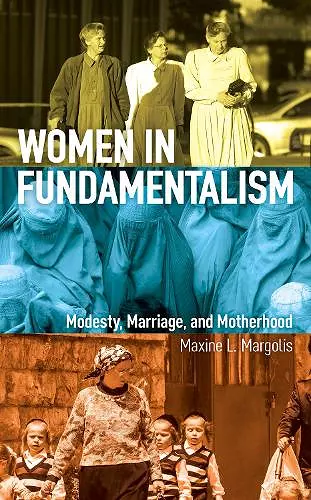Women in Fundamentalism
Modesty, Marriage, and Motherhood
Format:Hardback
Publisher:Bloomsbury Publishing PLC
Published:10th Oct '19
Currently unavailable, and unfortunately no date known when it will be back

Women in Fundamentalism examines the striking similarities in three extreme fundamentalist religious communities in their views about and treatment of women. Whether Christian, Jewish or Muslim, the fundamentalist offshoots of these religions subject women to myriad restrictions in their daily lives. All three seek to maintain male control over women’s bodies, women’s activities, and the people with whom women associate. The three also share common ideologies about women's “true nature" and proper place. The specific cases covered in this text are (1) Mormon polygamists, specifically the Fundamentalist Church of Jesus Christ of Latter-Day Saints (FLDS), who live in Utah, Arizona, Texas, and isolated enclaves in Canada and Mexico; (2) the Satmar Hasidim of Williamsburg, Brooklyn, Kiryas Joel a town in Orange County, New York, and several settlements in Israel; and (3) an extreme brand of Islam practiced by the Pashtun ethnic group of Afghanistan and neighboring areas of Pakistan.
This book effectively bridges the disciplines of women’s studies, religion, and anthropology, making it a valuable resource for professors and students seeking new qualitative and quantitative material on women’s positions in various religious traditions.
This book is interesting, timely, and readable and will appeal to a wide range of audiences and stimulate public discourse. Its systematic comparison of gender roles in three geographically and culturally separate fundamentalist communities is intrinsically interesting to any student of society. -- Conrad Kottak, University of Michigan
Maxine Margolis casts an anthropological eye on three cases of gendered fundamentalism. Although male power and the systematic control of women (their bodies, sexuality, marriage choices, and access to public space) have characterized state societies for centuries (China, India, Cultures throughout the Mediterranean), the Satmar Hasidim, the Fundamentalist Church of Latter Day Saints, and the Pushtun of Afghanistan and Pakistan persist in contemporary times. Despite their differing contexts (urban Brooklyn, small town Arizona and Utah, and rural villages in an Islamic society) the similarities are striking. Yet Margolis shows they also face irreversible changes brought by the internet, secular education, entanglements with the US legal system, and Western organizing around human rights. -- Louise Lamphere, University of New Mexico
Margolis brings an anthropologist’s eye to a question of broad and long-standing interest: what accounts for the parallels in the views and treatment of women in three apparently distinct religious communities. In this extended meditation on the underlying logics of female subordination among extremist groups, Margolis reminds us of the value of structured comparison, a forgotten art in this era of increasingly narrow specialization. -- Misha Klein, University of Oklahoma
ISBN: 9781538134016
Dimensions: 237mm x 160mm x 20mm
Weight: 454g
218 pages